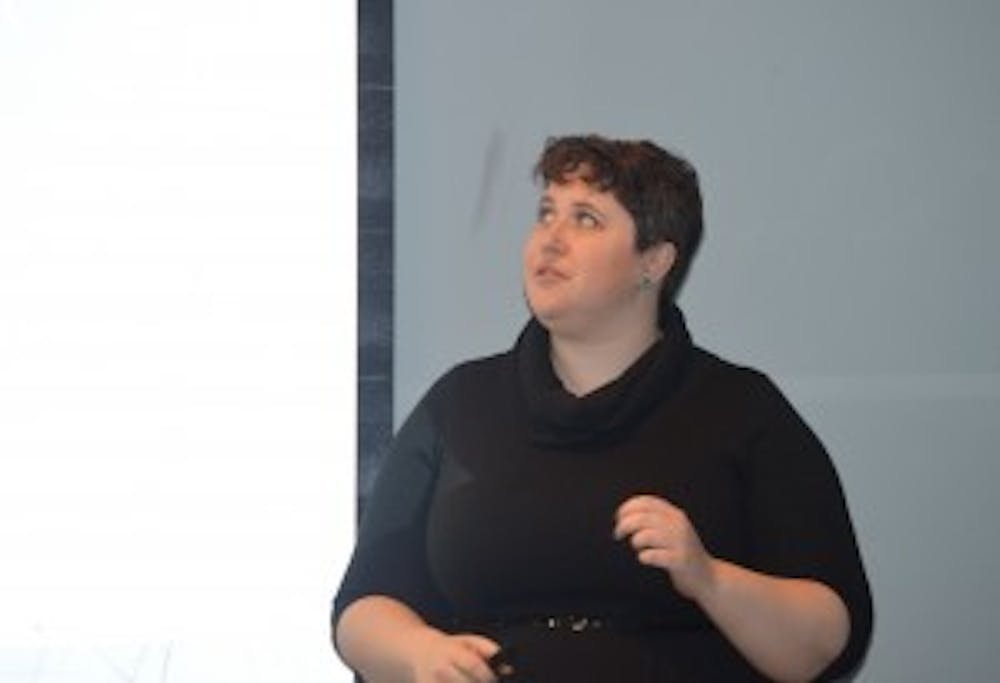As a part of women’s history month, the Digital Media Center (DMC) held a talk on the role of women in the video game community on Feb. 5. The talk was titled “Pretty Dolls or Rational Actors?” and was given by Bridget M. Blodgett, an assistant professor at the University of Baltimore in the Simulation and Digital Entertainment program.
The DMC’s first women in gaming event was held last year, in part stimulated by the University’s recent increase in support for the women’s history month commission. Junior Erica Schwarz, a student organizer, talked about how the DMC’s choice to hold talks detailing the struggles of women in gaming.
Blodgett holds a Ph.D from the College of Information Sciences and Technology at Penn State University, which she earned in May 2011. Her research focuses on the how virtual worlds and Internet culture create a social impact in our lives offline and on the use of technology within this culture.
More recently, she has focused on gender inclusiveness and identity within the gaming community, in light of recent events that sparked a discussion around these issues.
“We’re from the digital media center, so gaming is a big priority and probably one of the spheres where this sort of issue comes up the most in that it’s very visible,” she said.
Blodgett opened her talk with a series of facts about women in the gaming industry. One notable statistic she mentioned is that although 45 percent of people playing video games (and 46 percent of the people purchasing them) are female, between 4 percent and 23 percent of people working to create these games are female. This highlights a sizable disconnect between the demographics of producers and consumers in the gaming industry. “There have been women in gaming since gaming has been around, but you wouldn’t know it if you looked at the popular press around it,” Blodgett said.
She went on to discuss the reasons why women are not entering the gaming industry, highlighting the role of hyper-masculinity in this phenomenon. The notion of hyper-masculinity is one that is both physical and mental.
Physically, the hyper-masculine refers to an athletically built, tough man, which can often be seen in the physical design of video game characters.
Mentally, the hyper-masculine refers to notions of intellectual superiority and emotional resignation. As a result, the role of women, both in the virtual world and the designing of the virtual world, ends up opposing this ideal and is thus viewed negatively.
Blodgett discussed women being placed in either the role of the sexual object, the overly talkative complainer or the invisible actor, none of which are conducive to women holding roles within the creation of video games.
Moreover, Blodgett discussed the overt threats that women faced when speaking out about the difficulty released by Penny Arcade in 2012 titled “Dickwolves”, which made jokes about women getting “raped to sleep by the dickwolves.”
This cartoon caused controversy, as many people agreed that making a joke based on sexual assault was extremely out of taste. However, the cartoonists’ apology only did more to mock those complaining about the cartoon than apologize for the content.
When Leigh Alexander, who describes herself as “a writer and critic focused on the ways technology and media intersect with culture and self-expression,” commented on this controversy, she received many threats, particularly over Twitter.
When analyzed, the tweets directed at her frequently involved threats of rape. This dramatic escalation of hate speech shows the strength of the misogynistic culture that still exists around the gaming industry.
As Blodgett described this incident, the audience was visibly taken aback. There were many men in the audience, a phenomenon which Blodgett herself commented on, commending them for taking an interest in the subject.
Many students engaged in discussion with her after the presentation, asking questions about whether she believes a shift could occur toward greater inclusivity within the gaming community.
Not only was the role of women discussed, but one student raised the issue of the lack of inclusivity of non-binary people in the video game industry.
Blodgett remained hopeful, even when discussing larger video games that are part of the AAA, a classification used for video games with the largest budgets for development and the highest levels of promotion.
“It is an industry — they’re there to sell,” she said.
This implies that if the public wants more inclusive games, the industries will be forced to produce such games. Once again, this emphasized her point that the shift toward inclusivity must come from consumers.
The second half of the talk was devoted to questions from audience members. One student asked how long before she thought there would be a bigger representation of gender fluidity within RPGs where players are able to design their own character.
“My cynical answer is that it has only been since 2010 that you can play a woman in most RPGs. So the likelihood of moving beyond that is in the very, very distant future,” Blodgett said.
Freshman Sabrina Mackey enjoyed the talk because it was about an experience that she herself has encountered.
“I’ve gotten things like, ‘Oh do you even play real games? List the games that you play. Do you even watch real anime?’”
“And more,” she continued, “like ‘Oh I don’t think girls are tough enough to play these games’ and ‘You just aren’t tough enough to look past the nudity and all of those sexist representations of women because you’re not strong enough.”





